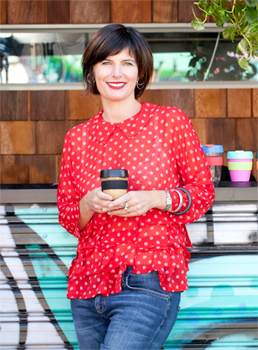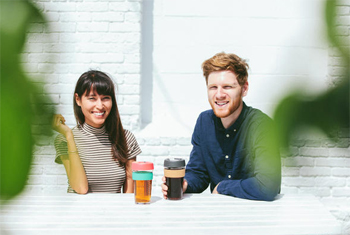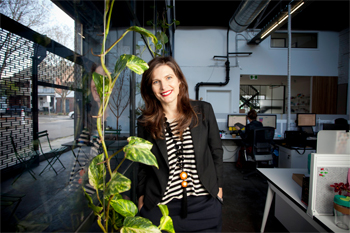Abigail Forsyth KeepCup Collection Interview

Abigail Forsyth KeepCup Collection Interview
Entrepreneur and mother of two Abigail Forsyth has always been a passionate problem solver.
Following her Law and Arts studies at the University of Melbourne, Abigail worked as a solicitor. In 1998, her career path changed significantly when - along with her brother Jamie - founded Bluebag, a fresh and healthy collection of cafés in Melbourne's busy CBD laneways.
Abigail and Jamie were alarmed by the huge quantity of food packaging used by hospitality industry and they began searching for more sustainable and stylish ways to serve food and coffee.
Unimpressed and uninspired by other reusable cups on the market, Abigail and Jamie decided to design and manufacture their own version. The outcome was a lightweight and thoroughly considered design that was BPA free and non-toxic; the world's first barista standard reusable cup, KeepCup was established.
Over 5 million environmentally conscious people have now adopted the KeepCup. If we estimate that 80% of these people drink 8 takeaway coffees each week, then over a year, KeepCup users will have diverted 3.5 billion disposable cups from landfill. This equates to removing over 4000 tonnes of disposable cups from landfill and saving enough energy to power 5000 homes for a year. Furthermore, this leaves 50,000 trees left standing in a forest somewhere – that's a lovely thought.
The first KeepCup was sold in June 2009 and eight years on, the brand has developed into a global phenomenon. Abigail heads up the team of over 40 employees, with offices in Melbourne, London and most recently Los Angeles.
From modest beginnings, the KeepCup is now keeping drinks warm in 65 countries throughout the globe including Australia, the United Kingdom, New Zealand, the USA, South Africa, parts of Asia, and throughout Europe, with plans to broaden their -Reuse Revolution' even further.
 In Melbourne, a city where coffee and style go hand-in-hand, leading restaurateurs and café trendsetters have joined the fan club. Seven Seeds, Five Senses, Merlo, Campos and Toby's Estate are but a some of the premium roasters who have thrown their support behind KeepCup, while some of their high-profile corporate clients have included ANZ, NAB, Westpac and QANTAS.
In Melbourne, a city where coffee and style go hand-in-hand, leading restaurateurs and café trendsetters have joined the fan club. Seven Seeds, Five Senses, Merlo, Campos and Toby's Estate are but a some of the premium roasters who have thrown their support behind KeepCup, while some of their high-profile corporate clients have included ANZ, NAB, Westpac and QANTAS.
Abigail and the KeepCup brand have changed the way even the most discerning coffee drinkers enjoy their daily dose and she has since been commended in several globally renowned awards. She was a finalist in the City of London's Sustainable City Awards (2010), Premier's Design Awards (2010) and Melbourne Day Awards (2010), as well as being shortlisted for the Australian International Design Awards (2010) and the Red Dot Industrial Design Awards Hamburg (2010).
Abigail has devoted her professional life to finding creative solutions that challenge our disposable culture by developing the KeepCup business using her strong leadership skills and business acumen. For a product that weighs only 61 grams, KeepCup has revolutionized consumer behaviour and spread worldwide.
Abigail Forsyth says: 'We think of ourselves as a campaign supported by a product, where the best reusable is the one you use. Ours just happens to be pretty awesome. Many small acts will make a phenomenal difference."
http://www.keepcup.com/
Interview with Abigail Forsyth
Question: Can you tell us about the LongPlay glass KeepCup collections?
Abigail Forsyth: KeepCup's answer to the thermos. The removable tritan sleeve creates a thermal insulation barrier between your hand and the glass cup. It assists to maintain temperature for hot and cold, as well as insulating your hand from heat and condensation. We are thinking about the USA and their love of ice coffee.
Question: What inspired the Star Wars collection?
Abigail Forsyth: My love of Star Wars! The revelation was less commercial, than a fun project with characters and a story that I loved when I was 7 years old. The idea was to create KeepCups that were attractive and identifiable without being character cups. It turns out it's been a great opportunity to widen our audience and message around reuse.
Question: How does it feel to have recently sold your 5 millionth KeepCup?
Abigail Forsyth: Awesome
 Question: What can you credit your continued success to? How do you stay passionate in business?
Question: What can you credit your continued success to? How do you stay passionate in business? Abigail Forsyth: I credit success to persistence, genuine love of working, timing, good fortune in my family and friends, a fantastic team at KeepCup and a purpose. It's a lot of be inspired by.
Question: Can you give us an indication of the trees saved from KeepCup? How is best to look after our KeepCup? Where is KeepCup stocked?
Abigail Forsyth: Some fast facts about KeepCup:
Over one year the KeepCup, when compared to disposable cups, reduces landfill by at least 99%.
Over a year, use of a KeepCup reduces greenhouse gas emissions by up to 92% compared to disposable cups
The KeepCup breaks even after 15 uses, including washing, when compared with a disposable cup.
Our KeepCups are easy to look after, but can have different steps depending on which KeepCup you buy, however here are some care instructions for our Original.
Make sure you remove the lid and wash your cup and lid well after each use. The KeepCup Original can be placed on the top shelf of the dishwasher, make sure you remove the lid prior.
There is no need to remove the band from your cup or plug from your lid Be gentle with your KeepCup, we don't suggest using abrasive materials when cleaning.
Allow to dry completely before re-assembly.
The lid pops directly on and off, make sure you use the tab on the lid to lift off and click back on.
If staining occurs, applying a paste of baking soda and water then rinsing thoroughly can help reduce discolouration.
KeepCups are stocked in many cafes and retail shops around the world. For your nearest stockiest, head over to our website here.
Question: What's next for KeepCup?
Abigail Forsyth: We are currently doing a Life Cycle Analysis to look at hotspots in our supply and product life cycle to improve our environmental performance.
Interview by Brooke Hunter
MORE



